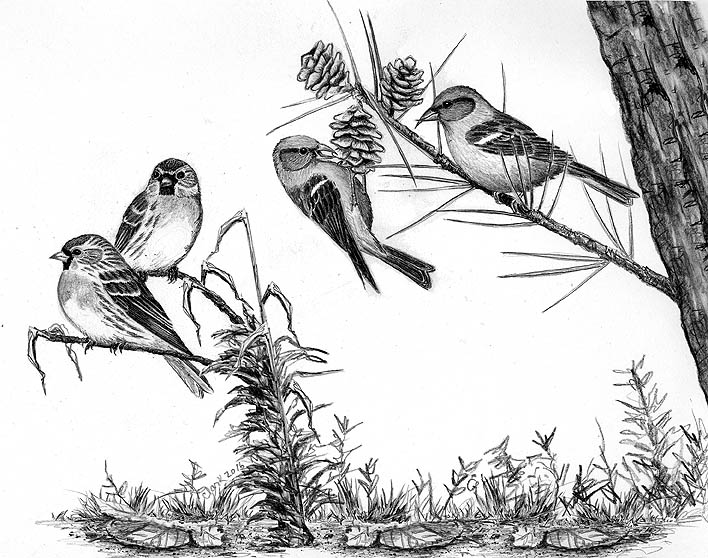
Dear Bird Folks,
A few years ago you wrote a column in which you mentioned a guy (I forget his name) who predicts if we’ll see unusual birds on our feeders in the winter. Has the guy made any predictions for this winter?
– Felix, Cataumet, MA
He’s Ron Pittaway, Felix,
Ron Pittaway is the guy you are asking about. While others folks are worried about the stock market or if their cell phones will explode, Ron has been outside looking for pinecones, acorns, hazelnuts and birch seeds. Why does he do this? Is he a seed broker, or a vegan…or a squirrel? No, but all of those are good guesses. Ron is actually a founding member of the Ontario Field Ornithologists. (Now don’t you feel silly not knowing that?) Each year Ron gathers information about the cone and seed crops in eastern Canada; and based on what he finds, he predicts which winter finches will likely venture south in search of food. While most of Ron’s work pertains to Ontario, sometimes these birds find their way across the Canadian border to New England, and hopefully Cape Cod (unless someone builds a wall along that border, too).
Each spring, like clockwork, hummingbirds and orioles return to the Cape from Central America. These birds love our summer weather, but hate the winter. Meanwhile, up in Canada, there are birds such as siskins, redpolls, grosbeaks and crossbills (collectively known as winter finches) that don’t mind the winter. They can easily handle the cold and snow. Well, they can handle it if there is enough food available. When northern seed crops fail, the birds strike out in search of alternatives. Unlike spring’s dependable return of orioles and hummingbirds, birders don’t know from one winter to the next if redpolls, crossbills, etc. will make an appearance in our area. This is why birders (and birdseed sellers) eagerly await Ron Pittaway’s annual prediction. Birders want to know which winter finches they are likely to see eating from their feeders. And the wife of one particular birdseed seller wants to know if she can anticipate an expensive present on Christmas morning, or if she’ll end up with something from the local swap shed…again.
Ron is telling us not to look for any Pine Grosbeaks on Cape Cod this year. These very red (males only) and very tame grosbeaks enjoy mountain ash berries, which are plentiful right now and thus, there is no reason for these friendly birds to wander far from home. Years ago the Purple Finch was our most common red finch, but that was before the introduced House Finch started pushing it out. Ron reports that the Purple Finches’ food supply is low up north and that the birds are already on the move south. This means that all of the people who continue to mistakenly call House Finches, “Purple Finches,” may actually be right for a change.
Four years ago, during the winter of 2012/13, both Red Crossbills and White-winged Crossbills invaded Cape Cod in historic numbers. These chattering birds, with beaks that actually crisscross (to enable them to open pinecones more easily) were seen on feeders all over the Cape. There probably won’t be another “invasion” this winter, but Ron thinks a few crossbills are headed our way, and evidence to support his prediction is already coming in. Last week a birder in Provincetown spotted twenty White-winged Crossbills flying over the parking lot at Race Point. Of course, Ron’s predictions aren’t always perfect. Last year Common Redpolls (finches with red caps and black goatees) were supposed to be headed our way, but they never arrived. It appears the birds found a bumper crop of balsam fir seeds much farther north and that put a halt to their migration. Undeterred, Ron once again thinks redpolls will be migrating south and hopefully they will be eating from our birdfeeders. (Oh, please. Oh, please. Oh, please.)
Speaking of mistakes, last year I boldly announced that we would be overrun with Pine Siskins (stripy goldfinch-looking birds), solely based on the one lone siskin I saw on my feeder in the fall. Apparently that particular siskin didn’t have any friends, because I never saw another siskin the rest of the winter. Ron thinks we might have a better chance of seeing some siskins this year. He says many of these tiny, thistle-loving birds are already on the move this way. (Be still, my heart.)
In addition, a few of our more common Cape birds may be getting a population boost this winter. Acorn and hazelnut supplies are low up north and as a result, Blue Jays from Canada may be headed our way. (Sweet!) Also, if my yard is any indication, we could be seeing far more Red-breasted Nuthatches than usual. For the past few weeks, more and more of these squeaky birds have been lining up at my feeders. (Once again, sweet!) I used to think that if an area in Canada happened to be low on food, the birds would immediately head south. But this isn’t necessarily the case. The birds don’t care where the food is. They are just as likely to fly west or even farther north and never come to the Cape. (Not so sweet.)
All and all, Ron Pittaway thinks we have a decent chance of getting some siskins, redpolls and maybe even a few crossbills on our feeders this year, Felix. Seeing some of those northern finches would make our winter more interesting. But if for some reason these seed-hungry birds don’t arrive, I can handle it. I know where the best swap sheds are.